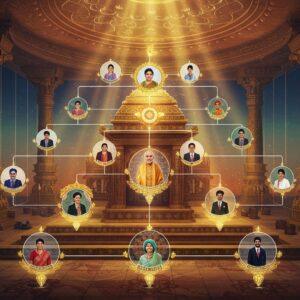
Religion and politics in India share a deep and intricate connection, a relationship that has evolved over centuries. This blog delves into the dynamic interplay between religious beliefs and political practices, exploring how they influence each other through history, legal frameworks, and contemporary issues. This exploration underscores the importance of balancing religious beliefs with political actions to ensure peace and progress. For up-to-date information on this complex relationship, refer to recent search results highlighting the significance of freedom of conscience and the separation of church and state, a principle supported by a majority of Americans. These searches also reveal how religious influences can affect political participation and how political systems can shape religious practices, such as in communist countries like China where the government controls religious activities.
Historical Context: The Evolution of Religion and Politics in India
India’s historical narrative is interwoven with the threads of religion and politics. Ancient India witnessed the profound influence of Hinduism, Buddhism, and Jainism on governance and rulers. The Mauryan emperor Ashoka’s embrace of Buddhism exemplifies how faith guided his reign. The Mughal Empire, particularly during Akbar’s rule, showcased the integration of diverse religious traditions into political strategies, blending Islamic and Indian practices. The British colonial period introduced Western political ideologies, impacting Indian religious practices while India’s rich spiritual heritage endured. The partition of India in 1947 dramatically reshaped the religious and political landscape, creating new dynamics and challenges.
Legal Frameworks: Governing Religion and Politics in India
The Indian Constitution serves as the bedrock of secularism and religious freedom. Articles 25-28 guarantee the right to practice one’s faith while empowering the state to regulate religious activities for the sake of public order and health. The judiciary plays a crucial role in interpreting these laws, with landmark cases shaping the intersection of religion and politics. The ongoing debate surrounding the Uniform Civil Code exemplifies the complexities of implementing laws that impact diverse religious communities.
Religious Laws in India: Legislation on Religious Practices and Institutions
India has enacted several laws to manage religious practices and institutions. The Religious Endowments Act of 1863 oversees the administration of religious properties. The Places of Worship (Special Provisions) Act, 1991, preserves the status of worship sites as they existed on August 15, 1947, to maintain religious harmony. Anti-Conversion Laws, present in various states, aim to prevent forced religious conversions, though their impact on religious freedom remains a subject of debate. The Wakf Act, 1995, regulates Muslim endowments and properties.
Politics and Religion in India: Contemporary Dynamics
In contemporary India, religious identities often shape political affiliations. Major political parties like the BJP and INC frequently align with specific religious sentiments, influencing their platforms and campaigns. Religious leaders hold considerable sway over political processes, their endorsements impacting elections and policy decisions. Social movements, such as the Ram Janmabhoomi and Shaheen Bagh protests, demonstrate the power of religion to mobilize political action.
Mutual Influence: How Religion and Politics Shape Each Other
Political decisions often reflect underlying religious beliefs, with leaders incorporating religious festivals and rituals into their campaigns. Public opinion, deeply rooted in religious sentiments, influences voting patterns. Religious media plays a significant role in shaping political narratives, and faith leaders often contribute to conflict resolution efforts, promoting peace and harmony.
Poojn.in: Supporting Your Religious Practices
Poojn.in, India’s largest cultural goods and services store, empowers you to observe your religious practices while respecting diverse political views. We offer:
- Authentic puja items and samagri for all deities, fostering a deeper connection with your faith. Our collection includes items for major Hindu deities like Brahma, Vishnu, and Shiva, catering to a wide range of devotional practices.
- Comprehensive puja kits for various ceremonies, simplifying your rituals and enhancing your spiritual experience. We ensure the authenticity and quality of our products, sourcing them from trusted suppliers.
- Sacred items for deity worship, reflecting diverse regional customs and traditions. Our range caters to specific regional practices, ensuring you find the right items for your needs.
- Verified religious items meeting traditional standards, ensuring authenticity and quality in your spiritual practices. Each item undergoes rigorous quality checks, guaranteeing its adherence to traditional standards.
- Convenient online shopping with doorstep delivery, making it easier to access religious goods. Our user-friendly platform and efficient delivery service ensure a hassle-free shopping experience.
- Expert guidance on the proper usage of religious items, enriching your understanding of rituals and traditions. Our team provides expert advice and support, helping you navigate the intricacies of religious practices.
- Quality-checked ritual materials from trusted sources, guaranteeing authenticity and adherence to traditional standards. We carefully select our suppliers, prioritizing quality and authenticity in all our products.
Poojn.in maintains a neutral stance, serving all communities and focusing solely on authentic religious items and practices. We provide factual information about religious customs, supporting traditional values without political bias. Visit www.poojn.in to explore our extensive collection.
Conclusion: Navigating the Future of Religion and Politics in India
The intricate relationship between religion and politics in India has shaped its governance and social fabric for centuries. Understanding this dynamic interplay is crucial for appreciating the nation’s rich cultural heritage. As India moves forward, balancing religious beliefs with modern governance will be essential for fostering a harmonious and unified nation. This exploration highlights the importance of responsible political actions that respect religious diversity while promoting peace and progress. You can further explore this topic through our related articles: Odisha’s Coastal Goddess Maa Ramachandi and the Ocean’s Influence, Prayagraj: A Journey Through Faith and Culture, and India’s Festivals: A Celebration of Culture and Spirituality.
FAQs: Religion and Politics
What is the role of religion in Indian politics? Religion holds significant sway in Indian politics, influencing voter behavior and political campaigns. Political parties often leverage religious sentiments to garner support and shape their platforms. This influence can be seen in various aspects of the political landscape, from campaign rallies to policy decisions.
How does religious law in India affect political decisions? Religious law in India, encompassing various acts and constitutional provisions, impacts political decisions by regulating religious practices and ensuring they do not disrupt public order. This legal framework strives to balance religious freedom with the need to maintain social harmony and prevent discrimination.
What are the key aspects of religion law in India? Key aspects of religious law in India include provisions for freedom of religious practice, protection of religious minorities, and restrictions on activities that may harm public order or incite violence. These laws aim to create a framework for peaceful coexistence and religious harmony within a diverse society.
Why is religion so influential in Indian politics? Religion’s deep integration into India’s cultural and social fabric makes it a powerful force in politics. Many voters’ identities and beliefs are closely tied to their religion, influencing their political choices and affiliations. This connection between personal faith and political views contributes to the significance of religion in the political sphere.
Can religious institutions participate in political activities? Religious institutions in India can engage in political activities, but within legal boundaries. They must ensure their actions comply with existing laws and do not violate principles of secularism or incite communal disharmony. This regulated participation allows religious institutions to voice their concerns while maintaining a balance between religious freedom and political neutrality.
How do political parties use religion to shape policies? Political parties often appeal to religious groups, promising to protect their interests and incorporating religious values into their platforms. This strategy aims to mobilize voters based on shared religious identities and concerns. However, it also raises questions about the separation of religion and state and the potential for discrimination against minority groups.
What challenges arise from the relationship between religion and politics in India? The interplay of religion and politics in India presents several challenges, including communal tensions, discrimination against religious minorities, and the potential for manipulating religious sentiments for political gain. Addressing these challenges requires a commitment to secularism, interfaith dialogue, and responsible political conduct.
Are there any laws that separate religion from politics in India? While India doesn’t have explicit laws mandating a complete separation of religion and politics, the Constitution promotes secularism as a guiding principle. This principle aims to ensure that politics and religion do not unduly interfere with each other, fostering a society where individuals are free to practice their faith without political coercion and where political decisions are made without religious bias.


